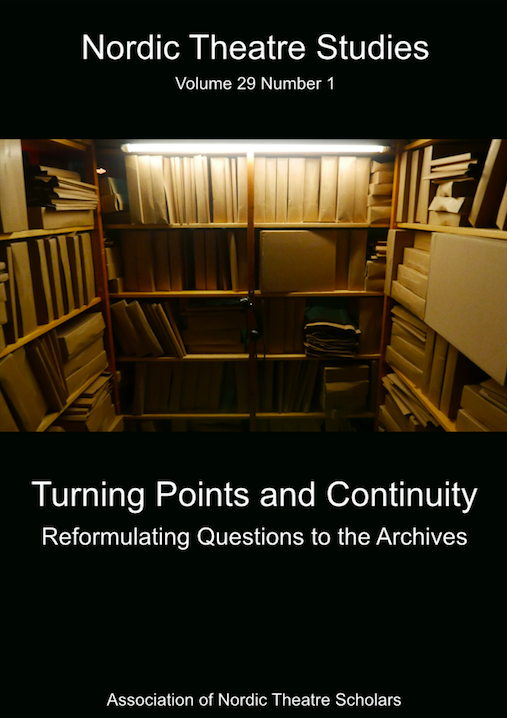Deconstructing Turning Points. A postscript on the canonization of the avant-garde 1900
DOI:
https://doi.org/10.7146/nts.v29i1.103315Keywords:
Historiography, periodization, modernism, avant-garde, development, archive, sources, Postlewait, DerridaAbstract
Deconstructing Turning Points is an attempt to understand why and how the period around the turn of the nineteenth century has been described as a “breakthrough of modern theatre”. Texts by Gösta M. Bergman, Christopher Innes and Erika Fischer-Lichte about this period are examined in order to see how these authors construct periodization. Leaning towards Thomas Postlewait’s concept of periods and Jacques Derrida’s deconstructive approach to discourse, the article points out some paradigmatic assumptions in the discussed texts. The three authors are not compared – writing in different languages and for different purposes – but some of the underlying paradigms become visible, namely their relation to historical development and their view of theatre as the work of the director. As an alternative, the article turns to archival possibilities. New concepts of what an archive is and can do, as Derrida sees them, open up for a living and challenging relation to archival sources, not just as evidence of prefabricated hypotheses, but as inspiring traces of the past.
References
Bergman, Gösta M. 1966. Den moderna teaterns genombrott 1890-1925. Stockholm: Bonniers.
Brockett, Oscar & Franlin J. Hildy. 2003. History of the Theatre. 9th edition. Boston et al.: Allyn and Bacon.
Changing Perspectives. Seventy years of Theatre Studies at Stockholm University. 2016. Lena Hammergren et al. (eds). Stockholm: Stuts.
Darwin, Charles. 1859. On the Origin of Species by Means of Natural Selection, or the Preservation of Favoured Races in the Struggle for Life. London: The Royal Academy.
Derrida, Jacques. 1978. Writing and Difference. Translated by Alan Bass. Chicago: University of Chicago Press.
Derrida, Jacques. 1981. ’Positions. Interview with Jean-Louis Houdebine and Guy Scarpetta’. Positions, Translated and annotated by Alan Bass. Chicago: University of Chicago Press.
Derrida, Jacques. 1995. ‘Archive Fever. A Freudian Impression.’ Diacritics, vol.25, No 2 (Summer 1995), 9-63.
Fischer-Lichte, Erika (ed.) 1995. TheaterAvantgarde. Tübingen & Basel: Francke Verlag.
Gascoign, Bamber. 1968. World Theatre. London: Marble Arch House.
Gillian, Perry & Francis Frascina & Charles Harrison. 1993. Primitivism, Cubism, Abstraction. The Early Twentieth Century. New Haven: Yale University Press.
Goldberg, RoseLee. 1979. Performance Art. From Futurism to the Present. London: Thames & Hudson.
Innes, Christopher. 1993. Avant Garde Theater 1892-1992. London & New York: Routledge.
Postlewait, Thomas. 2009. The Cambridge Introduction to Theatre Historiography. Cambridge: Cambridge University Press.
Sauter, Willmar. 2010. “Cyclic Perseverance and Linear Mobility of Theatrical Events.” In Carlotte M. Cunning & Thomas Postlewait (eds.), Representing the Past. Essays in Performance Historiography. Iowa: University of Iowa Press.
Schramm, Helmar. 1996. Karneval des Denkens. Theatralität im Spiegel philosophischer Texte des 17. und 18. Jahrhunderts. Berlin: Akademie der Künste.
Stanley, Liz. 2016. ”The Other Archives and Beyond”. In N. Moore, A. Salter & M. Tamboukou (eds.). The Archive Project: Archival Research in the Social Sciences. London: Routledge.
Theatre Histories. An Introduction. 2010. Phillip B. Zarrilli, et al. (eds). 2nd edition. Oxon: Routledge. Wickham, Glynne. 1985. A History of the Theatre. Phaidon: Oxford.
Downloads
Published
How to Cite
Issue
Section
License
The copyright belongs to the authors and Nordic Theatre Studies. Users can use, reuse and build upon the material published in the journal but only for non-commercial purposes. Users are allowed to link to the files, download the files, distribute the files on a local network (preferably by links), upload the files to local repositories if their institutions require them to do so, but not republish the files without proper agreements with the journal and the author.

